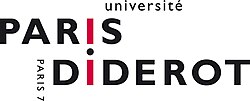University of Paris VII
| Université Paris 7 | |
| Type | Public |
|---|---|
| Established | 1970, following the division of the University of Paris (12th century) |
| Chancellor | Maurice Quénet Chancellor of the Universities of Paris |
| President | Christine Clerici |
| Students | 26,000 |
| Location |
Paris, France 48°49′47″N 2°22′51″E / 48.829722°N 2.380833°E |
| Website | www.univ-paris-diderot.fr |
Coordinates: 48°49′47″N 2°22′51″E / 48.82972°N 2.38083°E
Paris Diderot University, also known as Paris 7 (French: Université Paris Diderot (Paris 7), is a leading French university located in Paris. It is one of the heirs of the Faculty of Sciences of the University of Paris (together with Paris 6), which, founded in the mid-12th century, was one of the earliest universities established in Europe. It adopted its current name, referring to the French philosopher, art critic and writer Denis Diderot, in 1994.
Featuring two Nobel Prize laureates, two Fields Medal winners and two former French Ministers of Education among its faculty or former faculty, the university is famous for its teaching in science, especially in mathematics. Indeed, many fundamental results of the theory of Probability have been discovered at one of its research centers, the Laboratoire de Probabilités et Modèles Aléatoires (Laboratory of Probability and Random Models). The university is also known for its teaching in psychology, which adopts a specific approach drawing from both the domains of psychopathology and psychoanalysis.
The university also hosts many others disciplines: currently, there are 2300 educators and researchers, 1100 administrative personnel and 26,000 students studying humanities, science, and medicine.
Paris Diderot University is a founding member of the higher education and research alliance Sorbonne Paris Cité which is a Public Institution for Scientific Cooperation bringing together four renowned Parisian universities and four higher education and research institutes.
...
Wikipedia

